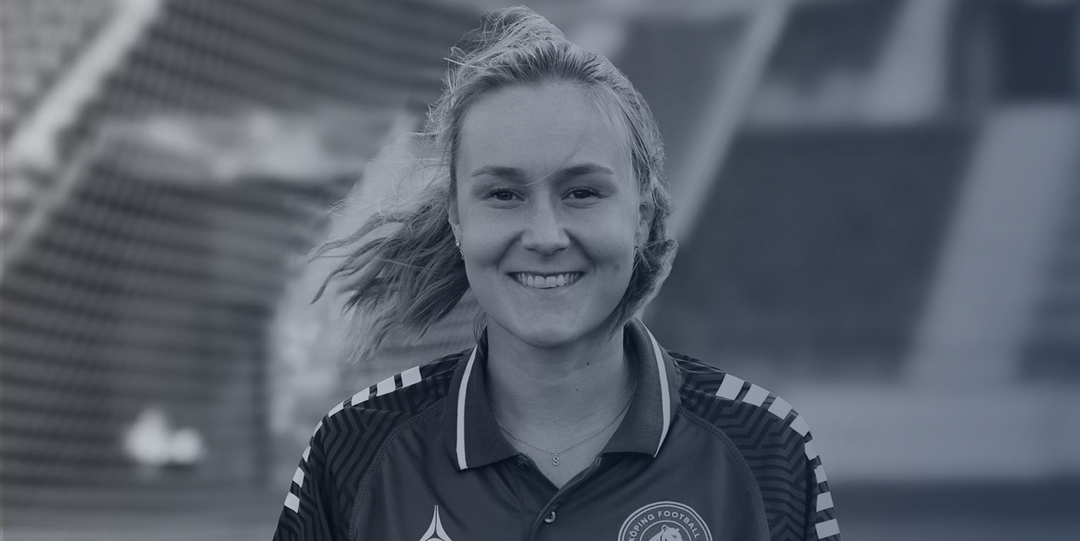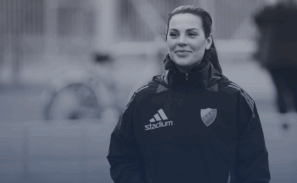When the team’s coach unexpectedly quit, player Fanny Måsabacka had to step in for the remaining training sessions of the season – and got hooked right away. Today she is head coach of Linköpings FC’s W17 team, assistant coach of the club’s team in OBOS Damallsvenskan and coach for Östergötland’s F08 team.
– One of my dreams is to have the opportunity to work as a full-time football coach someday, she says.
Like Åland’s most renowned footballer, Daniel Sjölund, Fanny Måsabacka also journeyed from IFK Mariehamn to Östergötland. Reaching OBOS Damallsvenskan was not her initial goal; she relocated to Linköping to pursue her studies to become a high school teacher and played football for LiU AIF in the third division.
In the fall of 2021, the team unexpectedly found itself without a coach, with no one available to fill the role.
– I stepped in and conducted the remaining training sessions for that year, after which the club’s sports directors asked if I wanted to become the playing coach for the following season. I believe I was approached because I had consistently taken significant responsibility within the club during my playing time. Additionally, I frequently offered my views on training exercises and methodologies
Måsabacka accepted the offer and simultaneously hung up her boots to fully commit to her new role.
– When I decided to try out coaching, I wanted to give it my all. Two and a half years later, I am truly grateful for the opportunity, as it has become the most enjoyable part of my life.
In 2022, Måsabacka enrolled in football coaching courses. Within a year, she was offered the role of coach for Östergötland’s F08 team, and by last autumn, she had earned her UEFA B license. This season marked a significant advancement in her career as she took on the role of head coach for the F17 team at Linköpings FC. Additionally, she has been assisting with the club’s senior team in the OBOS Damallsvenskan and serves as a coach educator in the county.
– My goal as a coach is that I every day, every training and in every meeting with my players will learn something new and develop myself. I am passionate about my role as a coach and want to be as good as possible. My dream is that one day I will have the opportunity to work as a full-time football coach.
What qualities do you consider most crucial to being a successful coach?
– Oh, that’s a tough question. Good football skills along with analytical and tactical abilities are crucial for making realistic assessments to develop players, create match-like practices, and win points in matches. I believe that a successful coach needs to be clear and have authority in their leadership in order to successfully convey the way of working, roles and the tactical aspects from theory to reality. It is also important to combine clarity with humility. I think it’s important to critically examine yourself in order to develop as a coach.
Through succeeding in building positive relationships between players and also between coaches and players so the players will feel safe both on and off the pitch is important for both individual and collective development, she believes.
– If you manage to build trust and good relationships, it’s easier to include players in working methods and also in evaluation. It’s also a prerequisite for players to be able to receive constructive feedback and become involved. Perceptiveness is an important quality in building relationships as well as to see the individual and not just the player.
– Finally, commitment is a key characteristic. Create commitment to engage players in their own development and in the team’s processes. Encourage them to seek their own solutions, support each other, and enjoy their time together.
What challenges do you usually face in your work as a coach and how do you deal with them?
– A big challenge is the time aspect. I wish I had more time for each player individually. One challenge is to coach all players in their role and in the actions the player has as areas of development. It is important to be close to the players and coach them in their roles on the field. I need to plan carefully to provide all players with feedback relevant to situations they will encounter during matches. It’s also important, and sometimes challenging, that practices, whether for skill or matches, are as similar to match situations as possible.
What is your vision for yourself and for women’s football in general?
– I want women’s football to develop and take up more and more space every day. There is a lot going on today, which is fantastic, and it’s exciting to be part of this journey. I want girls to have the opportunity to play football on equal terms with boys. Being involved in coaching girls in football is both enjoyable and enriching.
What needs to be done to bring out more female coaches at the elite level?
– It needs to be invested in female leaders and above all it probably needs attention. It’s important that there are both female and male role models for our boys and girls who play football. The importance of educating leaders should probably not be underestimated, it is important that education is offered to develop more coaches.
The interview was created through the project Elite Coaching Pathway in collaboration with EPOS, Sundström Safety, Akea and Game Insight.













